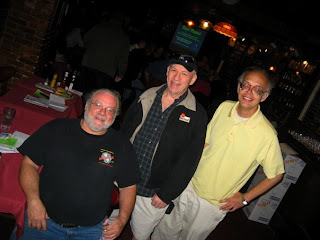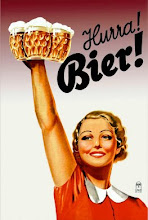Another week in the Capitol, and another fantastic beer event. On Saturday, November 7, The Smithsonian Resident Associates Program presented “Beer Planet: A Voyage of Discovery to the World’s Great Beers and Brewing Cultures” with speaker
Horst Dornbusch. An award-winning beer author and regular columnist for beeradvocate.com, Dornbusch entertained a group of 150 attendees with a fascinating history of beer and the evolution of brewing throughout civilization, beginning in Mesopotamia, expanding with the development of Europe and on up to the beer culture that we see in present-day America.
Beer Planet advertisement outside of The Brickskeller
Guests at this sold-out event, held at
The Brickskeller in Dupont Circle, were treated to thirteen different tasting-sized pours, each of which corresponded with a different section of Dornbusch’s lecture. Patrons took their seats and settled in for the three hour presentation and the first of thirteen tastes -
Old Brown Dog (Smuttynose Brewing Co., Portsmouth, New Hampshire). Attendees listened attentively as the raconteur told stories about Cleopatra and the invention of the beer tax, and the theory that beer brewing originated before the winemaking process.
Speaker and Beer Historian, Horst Dornbusch
With the history of beer and brew development in Germany came the second taste, a
Weihenstephan Hefeweizen (Bayerische Staatsbrauerei Weihenstephan, Germany), produced in the oldest continuously operating brewery in the world, dating back to 1040 AD. From there, participants sampled
Jever Pils (Friesisches Brauhaus zu Jever, Germany) and
Reissdorf Kölsch (Privat-Brauerei Heinrich Reissdorf & Co., Germany). Relating beer development to the development of law, Dornbusch explained the origins of the Reinheitsgebot, the German beer purity law, adding that about 95% of the edict has to do solely with price fixing, and very little actually pertains to the ingredients which may or may not be used in the brewing process.
Moving west to Belgium, the speaker gave a brief history of the Trappist tradition, explaining that monks merely copied and adapted what they had already found in existence, and from that, came Trappist ales. He mentioned that in today’s society, we might think that a beer bottled in a champagne-style bottle is high brow, though it wasn’t always so. In early Bavaria, bottling beers in champagne-style bottles would have been a symbol of one’s frugality, signaling that you were a poor bastard rather than a noble.
Belgian - style beer samples included
Ommegang Abbey Dubbel (Brewery Ommegang, Cooperstown, New York),
Saison Dupont (Brasserie Dupont, Tourpes, Belgium), and
Liefmans Kriek (Oudenaarde, Belgium).
Dornbusch expounded on the shift, in 1553, from the Bavarian “ale culture”, to a new “lager culture”, which he calls the most underreported event in beer history. As he explains it, Duke Albert V of Bavaria essentially enacted this shift, after placing a ban on summer brewing - believing that cold fermentation was safer and more pure than top-fermenting in the summer, and risking bacterial infections.
The British Isles tastings included
Fuller’s ESB (Fuller, Smith & Turner P.L.C., London, England),
O’Hara’s Irish Stout (Carlow Brewing Co., Carlow, Ireland) and
Boddington’s Mild Ale (Anheuser-Busch Inbev, Manchester, England). Dornbusch related that on a recent trip to London, he and his wife, Elva, had difficulty tracking down traditional British beers, noting that Anheuser-Busch products are sadly ubiquitous, even in historical British ale houses.
Lastly, in the North American segment of his presentation, Dornbusch expounded on the rise of American craft brews, stating that the United States is currently at the top of the world beer game, making over-the-top styles and implementing new and creative styles and processes. Guests tasted
Flying Dog Double Pale Ale (Flying Dog Brewery, Frederick, Maryland),
Allagash Curiexu Bourbon Cask Tripel Ale (Allagash Brewing Co., Portland, Maine) and
The Great Pumpkin - Imperial Pumpkin Ale (Clipper City Brewing Co., Baltimore, Maryland).
Beer Cronies: Dave Alexander (owner, Brickskeller), and beer writers Jim Dorsch and Greg Kitsock.
A brief Q&A session rounded out the lecture, and participants left full on beer and beer knowledge, satiated for the moment with an afternoon of history and education of beer culture.
This article was also recently posted at dcbeer.com, a website run by DC beer gurus Mike Dolan, Andrew Nations, and P.J. Coleman. Check them out!








